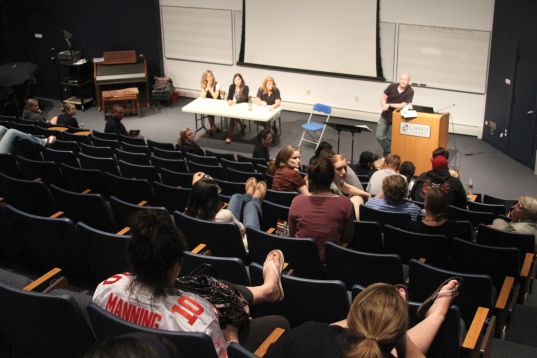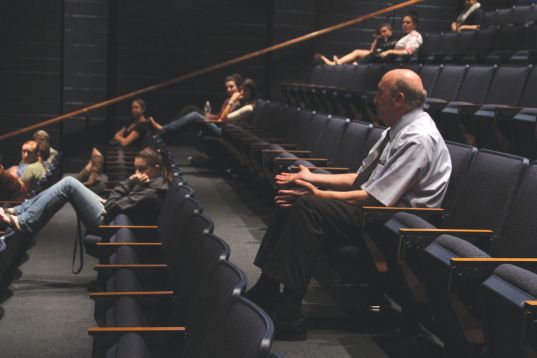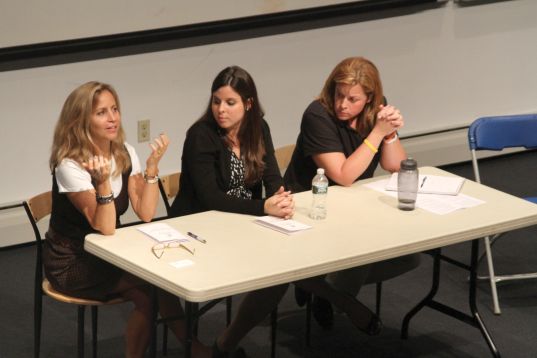***Correction: In the Sept. 29 issue of the Loquitur, Samantha Gil’s name was incorrectly printed as Stephanie Gill in the page 1 article. It has been corrected in the text below. The Loquitur apologizes for this error.***
A town meeting on social media and online harassment was held on Tuesday, Sept. 27. The Widener Lecture Hall was filled with students of all majors, a number of faculty and staff and members of Student Government Association (SGA), Office of Student Diversity Initiatives, Student Engagement and Leadership, Body Image Coalition and Residence Life.
Brought together to discuss the effects of cyberbullying, students, faculty and staff were introduced to Dr. Andrew Owen, the moderator of the forum. Owen introduced the three faculty members on the panel: Andrea Sussel, Counseling and Psychological Services, Samantha Gil, assistant director of co-op and career services and Sue Kramer, director of Residence Life, were all open to questions and comments and were used as important resources during the meeting.
The forum started off discussing the idea of being accused of cyberbullying based on things said on the Internet. Students began sharing ideas and personal stories. Questions were used to keep the forum on pace. Could someone ever accuse you of being a cyberbully based on something you say online?
“It all has to do with tone,” Nicki Shovlin, president of SGA, said. “You can mean something as a joke but that may not be how it is interpreted.”
The idea of the First Amendment Right was also discussed. If Americans have the right to freedom of speech, then how does that affect what people say on social media outlets?
“Your rights end when you take your freedom of speech and tamper with others’ freedom of expression,” Mario Marino, freshman finance and marketing major, said.
After some personal stories about friends who have dealt with cases of bullying were told, the conversation took a quick turn and the rest of the meeting was spent discussing the controversial Twitter account, the former “Cabrini Bitch” and the current “University Bitch.”
The beginning of the discussion was mostly informational about the Cabrini College Community Standards for Student Conduct. Kramer explained the definition of bullying and the consequences for doing so.
The fate of the Twitter account owner was questioned.
“Like with all situations, we would first have to have a conversation,” Kramer said. “The conversation would then be followed by a violation of the code of conduct check.”
Kramer explained that the entire copy of the account and the posts would be printed out and line-for-line, read and reviewed.
Stephanie Reed, director of Student Diversity Initiatives, spoke about the real reason for the Twitter discussion.
“We are not here to try and figure out who the person is,” Reed said. “We are just hearing a lot of outcries about this situation.”
Calii Brown, sophomore criminal justice major, talked about the division between the student population and how everyone perceives the account.
“You have people who are divided,” Brown said. “Some people love it and some people find it offensive.”
Brown then went on to discuss how to spam the account and the major effects it would have if the entire community did so.
“The people who give this person power are the people who read all of the posts,” Owen said. Owen then asked why people are following the Twitter account and engaging in it.
“You don’t even have to follow the account or read it,” Alyssa Berger, president of the Body Image Coalition said. “Everyone is talking about it. You just have to walk through the café and you will know what is being said.”
Some students view the posts as humorous and others as hurtful. Sussel described it as “Schadenfreude.” Schadenfreude is the enjoyment obtained from the trouble of others. Sussel also added the concern we should have for people who deliberately offend and bully others.
“People who post things like this probably don’t have the most positive feelings about themselves,” Sussel said. “Like the quote, ‘Evil thrives when good men do nothing.’”
With over 255 followers as a community, we are fueling the fire. Attendees of the meeting asked for the promotion of discontinuing the negative comments.
“We can make the change,” Kramer said. “If we do the positive thing.”
Bullying itself is a problem. With all of the new use of social media sites, cyberbullying has become a problem for individuals and groups alike. Whether someone means to be hurtful or not, freedom of speech on the Internet comes with great responsibility.
“We have so many resources available to us to deal with bullying,” Marino said. “We are blessed to live in a country where so many people are on board against it.”





